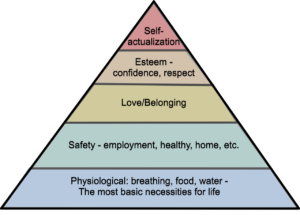
Guest post by Niraj Ranjan Rout
Maslow’s Hierarchy of Needs, an 80-year old psychology theory, can be apply to customer service by focusing on the agent experience.
Critics often argue that the levels in Maslow’s Hierarchy of Needs Theory aren’t universally applicable across cultures. Or suggest that the hierarchical nature of needs is too rigid to account for the complexities of human behavior.
Some even question its relevance in today’s fast-paced, digitally connected world, where basic needs are often taken for granted.
So, why then consider this oft-criticized model for understanding the needs and motivations of frontline customer support agents?
The answer lies in its enduring capacity to offer a comprehensive, if not entirely unflawed, view of human motivation.
Despite its shortcomings, the model gives us a structured way to approach the multi-faceted needs of customer support staff who serve as your brand’s first point of contact with customers.
While we might not find a one-size-fits-all solution in Maslow’s pyramid, what we do find is a valuable framework for thinking more holistically about how to motivate and engage a workforce in roles that are crucial to customer perception and, ultimately, to our bottom line.
Related: 4 Contact Center Trends For A Better Customer Experience
Investing In The Human Element: Beyond FAQs And Dashboards
If the end goal is to have a brand that not only resonates but also stays etched in the minds of customers, then the solution lies in something far more nuanced than the latest software or marketing gimmick.
The key to a memorable brand is the experience it delivers, and this experience is largely shaped by our frontline agents. It’s their interactions with customers that leave a lasting impression, making their motivation and engagement crucial.
What we’re really talking about here is not just equipping these agents with a script, tools, and tasks but understanding the core factors that drive them to excel or, conversely, to disengage.
At first glance, applying a theory that was developed in the context of individual self-actualization to a corporate setting might seem like a stretch. Yet, the roles frontline agents play are so closely tied to the emotional and psychological experiences of customers that it’s worth exploring this intersection.
So how do we delve into this exploration? The answer is surprisingly straightforward, yet often overlooked: by asking targeted, insightful questions. This is where we transition from the theoretical to the practical.

Maslow’s Hierarchy Of Needs For Customer Service Agents
Questions have a way of cutting through the noise. They help us zero in on what really matters. When it comes to your frontline agents, who are often the first and last point of contact for our customers, asking the right questions is more than just useful—it’s essential.
As you work through these questions, view them as actionable steps that will help you better understand your frontline agents, which in turn can directly influence the quality of customer experience you offer.
Physiological Needs:
- Are workstations optimized for agents to endure long hours without physical strain?
- How is the noise level in the call center affecting agent well-being and performance?
- Do agents’ work hours mesh with their natural sleep-wake cycles?
- Is healthy food readily accessible to agents during their breaks?
- Are their ergonomic needs, like headset comfort, taken into account?
If Ignored:
Discomfort and physical strain lead to a decline in focus and efficiency, impacting customer interactions.
Safety Needs:
- Is the workload manageable enough that agents don’t fear burnout?
- Are agents aware of the security protocols in place to protect sensitive customer information?
- How are agents trained to handle irate or potentially dangerous customer situations?
- Do agents have a quick line for internal support when they’re handling a challenging call?
- Are there transparent avenues for agents to report internal issues or concerns?
If Ignored:
Agents could become overly stressed and cautious, leading to suboptimal customer interactions.
Love and Belonging Needs:
- Is there a support system to help agents decompress after difficult customer interactions?
- How are we encouraging team cohesion within a role that’s often solitary?
- Are agents given opportunities to interact and build bonds with other departments?
- Do agents feel connected to their immediate supervisors and managers?
- Is there a mentorship system in place for new agents?
If Ignored:
Isolation can reduce agent morale, leading to a decreased ability to empathize with customers.
Esteem Needs:
- Are top-performing agents recognized in a way that motivates others?
- Is there a transparent and achievable pathway for career progression?
- Do agents have a say in decision-making processes that affect their work?
- Are agents provided with opportunities to develop specialized skills?
- How are agents’ suggestions and feedback incorporated into company policies?
If Ignored:
Demotivation and a lack of recognition can lead to a decrease in their drive to deliver proactive and quality customer service.
Self-Actualization Needs:
- Are agents empowered to make decisions that go beyond the script?
- How do agents contribute to the ideation of customer service strategies?
- Are there opportunities for agents to work on projects or tasks that tap into their unique skills or interests?
- Is there room for creative problem-solving within the confines of their role?
- Do agents have the opportunity to mentor or train others, providing a sense of accomplishment?
If Ignored:
Agents may become disengaged, resulting in a routine approach to customer interactions that lack enthusiasm and creativity.
Related: Improve Customer Service At Any Organization With These 3 Steps
Elevated EX And CX: Maslow’s Hierarchy Offers A Dual Payoff
An organization hyper-focused on metrics such as Average Handle Time (AHT), for example, runs the risk of cultivating a culture that values expediency over thoroughness.
On one front, customer loyalty, nurtured over time and built upon trust, may start to wane as interactions feel increasingly transactional. On the other hand, support agents, the very individuals responsible for maintaining these customer relationships, may begin to feel that their roles lack purpose and depth – the latter being a psychological imperative that Maslow identified as crucial for sustained motivation and performance.
By taking a Maslow-centric approach, we create a framework that fosters both individual growth and collective excellence. It helps us be prepared to face a market where the boundaries between human experience and business metrics will become increasingly permeable.
Niraj Ranjan Rout is Co-founder & CEO of Hiver – a Gmail-based, multi-channel help desk solution. Pyramid image by Te-ge Bramhall from Pixabay. Agent image was generated using ChatGPT.
